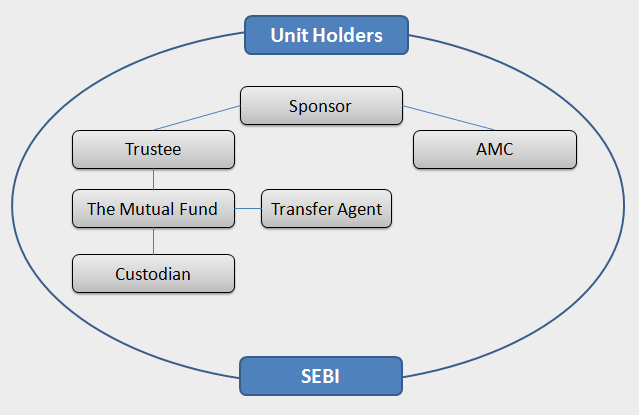- September 24, 2015
- by Prakash Lohana
- Articles
- 2255 Views
- 2 Comments
 In my last article “ All about Mutual Funds. Advantages & Disadvantages of Mutual funds”,I had discussed about basics as well as advantages and disadvantages of Mutual funds. Mutual Funds are very strong and stable vehicle for investing in different asset classes. Most of the investors whether they are investing in Mutual Funds or not, are not very clear about the Legal structure of Mutual Funds in India. This article is an effort to educate investors about the legal structure and functioning of Mutual funds in India. Practically as an investor understanding legal structure of the Mutual Funds will not add much value to your financial life but most of the investors consider Mutual funds as unsafe investments and have lots of misunderstanding about legal structure of Mutual funds, this article will clarify those misunderstandings and will make you understand how safe your money is with Mutual Funds.
In my last article “ All about Mutual Funds. Advantages & Disadvantages of Mutual funds”,I had discussed about basics as well as advantages and disadvantages of Mutual funds. Mutual Funds are very strong and stable vehicle for investing in different asset classes. Most of the investors whether they are investing in Mutual Funds or not, are not very clear about the Legal structure of Mutual Funds in India. This article is an effort to educate investors about the legal structure and functioning of Mutual funds in India. Practically as an investor understanding legal structure of the Mutual Funds will not add much value to your financial life but most of the investors consider Mutual funds as unsafe investments and have lots of misunderstanding about legal structure of Mutual funds, this article will clarify those misunderstandings and will make you understand how safe your money is with Mutual Funds.
Legal Structure of Mutual Funds:
Now we will see what is legal structure of Mutual Funds? & how Mutual fund companies are formed?
Who Regulates Mutual funds?
- Mutual Funds are regulated by the Securities & Exchange Board of India in India. SEBI has formed “SEBI MF Regulations 1996” to regulate functioning of Mutual Funds.
- Under this regulation Mutual Funds are formed as Public Trust under “The Indian Trust Act, 1882”.
- These regulations stipulate a three tired structure of entities – sponsor (creation), trustees, and Asset Management Company (fund management) – for carrying out different functions of a mutual fund, but place the primary responsibility on the trustees.
Who is Mutual Fund sponsor? & What are Roles & Responsibilities of Sponsor?
Mutual fund sponsor is basically promoter of the Mutual Fund Company. Sponsor either on his own or in association with another body corporate establishes a Mutual to earn money from fund management through its subsidiary company which acts as Investment Manager of the Fund.
Sponsors then,
- Set up a Public Trust under “The Indian Trust Act, 1882”, and appoint trustees to manage the trust. Gets trust registered with SEBI and also takes all the necessary approvals from the SEBI.
- Create an Asset Management Company under “The Companies Act, 1956”.
- As sponsor is the main entity promoting a mutual fund company and mutual funds are going to manage public money, SEBI has kept very strict guidelines for the eligibility of the Sponsor.
Registration of Trust & Appointment of Trustees:
- Creation of Trust: Sponsors create trust through trust deed in the favour of trustees. Trustees manage the trust and they are primarily responsible to investors in Mutual Funds. They are primarily guardians of Unit Holder’s money.
- Appointment of Trustees: Sponsor with prior approval of SEBI appoints trustees. There should be at least four members in the board of trustees with at least 2/3rd independent. A trustee of one mutual fund cannot be trustee of another mutual fund, unless he is an independent trustee in both cases and has the approval of both the boards. The trustees are appointed by executing and registering a trust deed under the provisions of “Indian Registration Act”. This trust deed is also registered with SEBI.
- Responsibilities of Trustees: Primary responsibility of Trustees is to see that all the due diligence is done properly and all the regulations are properly followed. All schemes floated by the AMC have to be approved by the trustees. Trustees review and ensure that the net worth of the AMC is as per the regulatory norms. They have to furnish SEBI a report on the activities of AMC on half yearly basis.
- Trustees also enter in an agreement with the Asset Management Company.
- Trustees can obtain necessary information from the Asset Management Company. All the schemes have to be approved from Trustee before they are launched.
- Trustees have to appoint all key personnel like Fund Managers, Auditors, Custodian, Registrar, Compliance Officer etc. and to inform the SEBI about same.
Asset Management Company: Trust will appoint Asset Management Company as Investment Managers through an agreement called “Investment Management Agreement”.
- Sponsor creates Asset Management Company and Asset Management Company manages funds of the Trust and against that it charges small fee. The AMC structures various schemes, launches the scheme and mobilizes initial amount, manages the funds and give services to the investors.
Sponsor, Trust and Asset Management Company are the Three Tir system which runs entire Mutual fund Business. Following are some other important entities involved in the functioning of a Mutual Fund.
Custodian: In Mutual funds , Asset Management Company buys different securities in the forms of Shares, bonds, gold etc. in different schemes. These Securities are bought in the name of Trust but they are not kept with the Trust. The responsibility of safe keeping the securities is on the custodian. Securities, which are in material form, are kept in safe custody of a custodian and securities, which are in “De-Materialized” form, are kept with a Depository participant, who acts on the advice of custodian. Custodian performs a very important back office operation. They ensure that delivery has been taken of the securities, which are bought, and that they are transferred in the name of the mutual fund. They also ensure that funds are paid out when securities are bought. Custodian keeps the investment account of the mutual fund. They collect and account for the dividends and interest receivables on mutual fund investments. They also keep track of various corporate actions like bonus issue, rights issue, and stock split; buy back offers, open offer etc and act on these as per instructions of the Investment manager.
Registrar & Transfer Agent: Registrar and Transfer agent is a separate entity. Registrar & Transfer agent has a responsibility of performing many administrative jobs like processing of applications of investors, creating units when new investment is made, removing units when investors made redemptions, keeping full record of investors, processing dividend payout. Mutual fund investors are spread across the country to small cities and towns so it is not possible to provide these services to investors at all these places by Asset Management Company. Registrar & Transfer Agents have their offices spread to these different locations and they work for many Mutual Funds to perform these jobs. So it becomes possible to provide services to unit holders at different locations in a very cost effective manner.
Auditor: Asset Management Companies are required to maintain separate books of accounts for all the schemes and prepare separate Annual reports for all schemes. An Auditor’s role is to examine books of accounts and annual report of all the schemes as an independent auditor. Asset Management Companies are also required to maintain their books of accounts and get the audit done under The Companies Act, 1956. As per rules separate auditors are appointed for Asset Management Company and Schemes.
Brokers: Brokers are registered members of the stock exchange whose services are utilized by AMCs to buy and sells securities on the stock exchanges. Many brokers also provide the Investment Manager (AMC) with research reports on the performance of various companies, sector and market outlook, investment recommendations etc.
Conclusion: From above discussion, it is clear that mutual funds are well regulated by SEBI. SEBI has formed three tired structure between sponsor, Trustee and Asset Management Company to ensure safety of investor’s money. Different agencies are involved in the functioning of the Mutual funds, like custodian is responsible for safe keeping of securities, transfer agent is responsible for creation of units and other services, Auditors verify that accounting is done properly as per regulations. Brokers are members of stock exchanges who provide services of buying and selling of securities. Trustees are responsible to take care of unit holder’s interest and reporting to SEBI. So the entire functioning doesn’t remain with Asset Management Company or Sponsors.


2 Comments